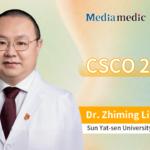
Editor's Note: From September 26 to 28, 2024, the 2024 CACA Integrated Esophageal Cancer Academic Conference, hosted by the Chinese Anti-Cancer Association and the CACA Esophageal Cancer Committee, was successfully held in Hefei. The conference, themed "Cancer Prevention and Treatment, Winning through Integration," brought together the latest research advances and clinical experiences in the field of esophageal cancer from domestic and international experts. During the conference, Oncology Frontier had the pleasure of inviting Dr. Yongde Liao, Director of the Department of Thoracic Surgery at Wuhan Union Hospita of China, to discuss minimally invasive surgery for esophageal cancer and the application of immunotherapy in the treatment of esophageal cancer. Below is a summary of the interview for the readers.Oncology Frontier: You have extensive experience in minimally invasive surgery for esophageal cancer. How do you evaluate the effectiveness and safety of minimally invasive surgery? What clinical factors do you consider when selecting minimally invasive surgery?
Dr. Yongde Liao: Minimally invasive surgery is crucial in treating esophageal cancer. Because esophageal cancer surgery involves esophagectomy, lymph node dissection, and digestive tract reconstruction, the procedure is long and involves multiple organs. Open surgery can be highly invasive for patients, making minimally invasive surgery more suitable in these cases. Many patients and their families have misconceptions about minimally invasive surgery, believing that it offers limited visibility, incomplete resection, or lower safety. In reality, minimally invasive surgery not only offers better efficacy but also higher safety, which is its primary advantage.
- Effectiveness: Minimally invasive surgery uses a thoracoscope with a magnification effect similar to a “microscope,” making thoracic structures and lesions clearer, enabling a more thorough resection to achieve optimal radical outcomes. Compared to open surgery, minimally invasive surgery is less invasive, allows faster recovery, and enables stronger tolerance to postoperative adjuvant therapies such as radiotherapy, chemotherapy, and immunotherapy, ultimately improving overall efficacy and patient quality of life.
- Safety: Nowadays, thoracoscopic technology is very advanced, and equipment is highly sophisticated, reducing the chances of equipment failure or abnormalities during surgery, thus ensuring safety. Additionally, in minimally invasive surgery, the primary surgeon and assistant operate together using a monitor with a shared field of vision, improving coordination. In traditional open surgery, assistants often have a limited view due to positioning and incision constraints, affecting teamwork.
Currently, 95% of esophageal cancer patients at our hospital opt for minimally invasive surgery, showing better efficacy and higher safety compared to open surgery.
Oncology Frontier: When performing minimally invasive esophageal cancer surgery, how do you assess the risk of postoperative complications and take preventive measures?
Dr. Yongde Liao: Esophageal cancer surgery typically involves esophagectomy, lymph node dissection, and digestive tract reconstruction, making it a major surgery with a higher risk of complications than general procedures. Complications can arise from three sources: the surgery itself, digestive tract reconstruction, and the surgery’s impact on other organs.
In addition to common complications such as bleeding, fistulas, and organ function stress reactions, esophageal cancer surgery also poses unique risks. Firstly, after reconstructing the digestive tract, patients are prone to gastroesophageal reflux. Normally, food travels from the mouth to the esophagus and into the stomach through the lower esophageal sphincter. However, after esophageal cancer surgery, reconstructing the digestive tract removes this sphincter, making it easier for food to reflux from the stomach to the esophagus, causing symptoms such as acid reflux, burning behind the sternum, or even pain. Reflux can also lead to aspiration, coughing, and potentially pneumonia.
Secondly, anastomotic leakage is another common postoperative complication. The junction between the esophagus and stomach may develop a leak, allowing food to enter the thoracic cavity or neck, causing discomfort, fever, and even more severe complications.
These complications significantly impact recovery and quality of life, making prevention and management essential after surgery. Doctors need to closely monitor patients’ postoperative conditions, take timely preventive measures, and respond quickly to minimize complications.
Oncology Frontier: Immunotherapy is receiving significant attention, especially in the treatment of esophageal cancer. Could you explain the current status of immunotherapy in esophageal cancer and the unresolved challenges?
Dr. Yongde Liao: Traditionally, esophageal cancer treatment has included surgery, radiotherapy, and chemotherapy. With the advent of immunotherapy, it is becoming a common option for esophageal cancer treatment. The proportion of immunotherapy applications is steadily increasing, especially through immune checkpoint inhibitors that release the immune system from tumor suppression. Tumors typically activate immune checkpoints to turn off the immune system’s ability to attack, but immunosuppressive drugs can activate the body’s natural anti-tumor immune response, restoring the ability to attack and clear tumor cells. Immunotherapy mobilizes the body’s lymphocytes—the “police force” within us—to combat tumor cells and help patients fight the disease.
Because early symptoms of esophageal cancer are not obvious, about 70% of patients are in the middle or late stages when diagnosed. For these patients, the effectiveness of direct surgery is often limited. Therefore, the use of immunotherapy as a neoadjuvant treatment is increasing for middle- and late-stage esophageal cancer patients. Immunotherapy can shrink tumors, improving the outcome of subsequent surgeries. It can also serve as an adjuvant therapy to enhance the effectiveness of other treatment modalities.
Although the future of immunotherapy in esophageal cancer is promising, many unresolved areas require further research and breakthroughs. For instance, identifying specific biomarkers to screen patients more likely to benefit from immunotherapy and effectively addressing common side effects during immunotherapy are current research priorities. As these issues are gradually resolved, immunotherapy’s application in esophageal cancer will broaden and yield better outcomes. I believe that day is not far away.
Dr. Yongde Liao Chief Physician, Doctoral Supervisor, Postdoctoral Cooperation Supervisor Director, Department of Thoracic Surgery, Union Hospital, Huazhong University of Science and Technology (National Key Specialty) Director, Cancer Integrated Screening, Diagnosis, and Rehabilitation Training Base, Chinese Anti-Cancer Association Vice Chairman, Lung Cancer Prevention Branch, China Medical and Healthcare International Exchange Promotion Association Chairman, Tumorology Branch, Hubei Medical Association Member, Esophageal Cancer Group, Thoracic and Cardiovascular Surgery Branch, Chinese Medical Association Member, Esophageal Group, Oncology Branch, Chinese Medical Doctors Association Chinese Director, International Society for Diseases of the Esophagus Standing Committee Member, Smart Medicine Committee, Chinese Society of Clinical Oncology Standing Committee Member, Mediastinal Tumor Committee, Chinese Anti-Cancer Association Member, Esophageal Cancer Committee, Chinese Anti-Cancer Association Standing Committee Member, Thoracic and Cardiovascular Surgery Society, Hubei Medical Association

